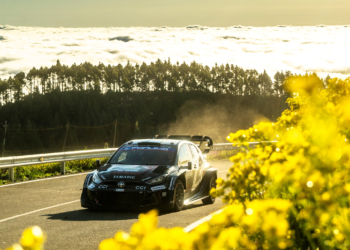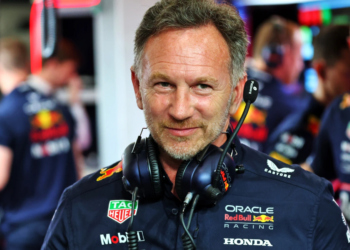Motorsport Week's sister publication Motorsport Monday sat down with an open and honest Romain Grosjean for a chat about his 2018 Formula 1 season, psychology, cooking, and Haas' long-term prospects…
Think of Romain Grosjean and who do you think of?
There is the 10-time podium finisher capable of a stunning turn of pace, in the process bagging outstanding results, as expected of a veteran of almost 150 Grands Prix. Then there is the driver banned for causing a multi-car pile-up, and who came close to the precipice again, via a litany of carbon fibre and frustrated rivals.
In 2018 Grosjean did not score points for eight races – a spell that included a crash under the Safety Car in Azerbaijan and a crazy first-lap accident in Spain – but wound up with 37 points, taking a high of fourth in Austria, and impressed elsewhere, most notably in Germany and Italy.
“S**t and good,” is how Grosjean reflects on 2018. “This is like a football game. Rubbish for the first half and then I played very well for the second half. First eight races, not a point, some bad luck, and some mistakes.” He pauses briefly. “Too many. And then before Germany where I knew I was back to where I wanted to be and from that point it was just a really good part of the season.”
Getting “back to where I wanted to be” was a crucial point in a season that had been creeping towards disaster. Grosjean has previously been very open in the fact that he consults a psychologist, with whom he has worked since September 2012, and who can count Olympians, golfers, businessmen “and one Formula 1 driver!” among her clients. Formula 1, and sport in general, is slowly realising that mental analysis and understanding of the psyche should be regarded as a strength and not a weakness, and that sportsmen are humans and not robots, and the regular discussions have helped no end for Grosjean.

“We were on the phone [before Germany] and we just chatted and went through everything and I realised there were a lot of things I hadn’t really sorted early in the year that weren’t right and were just polluting my mind,” he explains.
“We cleared it all, we worked through everything and moved on, and from the time the phone call was done I phoned my manager and said ‘in Germany I’ll be back, I’ll be where I want to be’.
“We’re all different. One of my weaknesses is to have things that are hurting me, you know, and then just not treating them, and putting them to one side thinking ‘it’s nothing it’s nothing it’s nothing it’s nothing’… and then eventually you get a big bag of unpleasant things and it’s just… they pollute you. It can be from a lot of things. It can be from a conversation, it can be from a race. It can be from being a father. Being a husband. Being a man. Just little things that you think ‘it’s nothing, it’s nothing, it’s nothing’ and then eventually it gets to you. [Formula 1] a job where passion and emotions are involved and therefore if you’re on the edge coming into a race track you know you’re going to be very easy to trigger out. Whereas if you’re relaxed and calm and confident and happy in the place you are it makes things much easier.”
Part of that happiness comes from spending time off-track cooking, a passion that led to Grosjean and his wife, Marion, releasing a recipe book last year.
“It’s a good way to relax, we all have different ways to relax,” explains the Geneva-based racer. “I love sport as well but if you do too much sport you get tired and then you get to a race and you’re tired and it’s not ideal, so cooking is a really good way to change my mind. The kids [Grosjean has three] love it as well. We can cook together, have fun, it’s a way of sharing love with my family.”
.jpg)
Ever the sportsman, Grosjean is able to view parallels between two sides of his life. “I’m lucky to have a lot of Michelin-starred chefs’ phone numbers so whenever I have a question I just send a Whatsapp,” he comments. “They love racing, I love cooking, so it goes well. It’s very similar. We’ve got pressure for quali and the race and then there is one guy standing on the podium but there is a team behind. For example, Guy Savoy, or Gordon Ramsay’s three Michelin-starred restaurants… if he hadn’t got a team behind him he couldn’t do that. And the pressure of [serving] the lunch or the dinner at exactly one time, everyone comes at the same time… It can go from being superb to being completely rubbish. Bit too much salt, that’s it.”
Grosjean, 32, is an intense character, speaking at scatter-gun pace, but what is clear is that he has found a home with Haas. As Lotus struggled financially though 2015, amid the long-winded eventual takeover by Renault, Grosjean upped sticks from the operation with which he had been linked since the mid-2000s, through highs and lows, and joined Gene Haas and Guenther Steiner at the newly-created team. He scored a stunning sixth on Haas’ debut in Australia 2016, improving to fifth next time out, sealing its status as a midfield team straight away.
“It’s a great atmosphere, it’s a great team because everyone is [going] in the same direction,” he says. “Everyone has got the same mentality that we come to the race to go racing, have fun and to enjoy racing and do our best. There’s always someone to back you up in case you do a mistake, which happens, and there’s no finger pointing. It’s a really good atmosphere for everyone to do his best and give his best and feel confident he can go for it and if it doesn’t work it’s not the end of the world: someone’ll be here to help. Gene trusts the management but he loves coming and you can see in his attitude that he loves racing and understands that it’s complicated, it’s not like you feel you’ve got a boss who’s putting $100m [into the team] and is just wanting results. No, he’s here and understands the racing, and he doesn’t put the negative pressure. There is pressure, it’s Formula 1, but it’s positive.”

Haas, having taken back-to-back eighth places in the Constructors’ Championship across 2016 and 2017, vaulted to fifth this season, in the process giving Renault a stiff challenge, a remarkable achievement in only year three.
“If in winter testing you would have brought a contract saying you’re going to finish fifth in the Constructors’ everyone would have signed,” beams Grosjean. “The third year is amazing. Obviously we fought hard for fourth, we got it at one point before we were disqualified at Monza, at least we gave Renault a good run for their money, and I’m sure next year we can go again. I think we’ve got a good baseline, we’ve got a good group of people working well, I’m actually quite positive for the future.”
Formula 1’s surge towards youth means Grosjean is already Formula 1’s fourth-oldest current driver and early next year will pass the 150 Grands Prix barrier – but don’t for one moment think he’s creeping towards the closing chapter of his career.
“I’ve done eight years in Formula 1, I believe I’ve got another 6, 7, 8 to go. Kimi’s 39 and signed a two-year deal! I started at 27 so it’s not like I started when I was 17. I’m 32 and have done six [successive] years in F1, I can go six, seven [more], I think I’ve got the energy for it as long as I keep performing.
“A lot of people lose their… you know Fernando [Alonso], why does he get frustrated and angry on the radio? I think, my opinion is, it’s because he hasn’t lost that wish to win, and you always want to win, so when you don’t win for three, four, five years and your car is s**t and you know it, you get frustrated. Other drivers, athletes in general, are happy with [earning] X million per year [and have the attitude of] ‘I do what I like’. I’m kind of the same as Fernando. I’ve never lost that wish that I can win a race.”
This feature first appeared in issue 295 of our sister publication Motorsport Monday – the world's leading digitial motorsport magazine published every Monday morning. You can subscribe for free by clicking here and we'll deliver it to your inbox every Monday.






